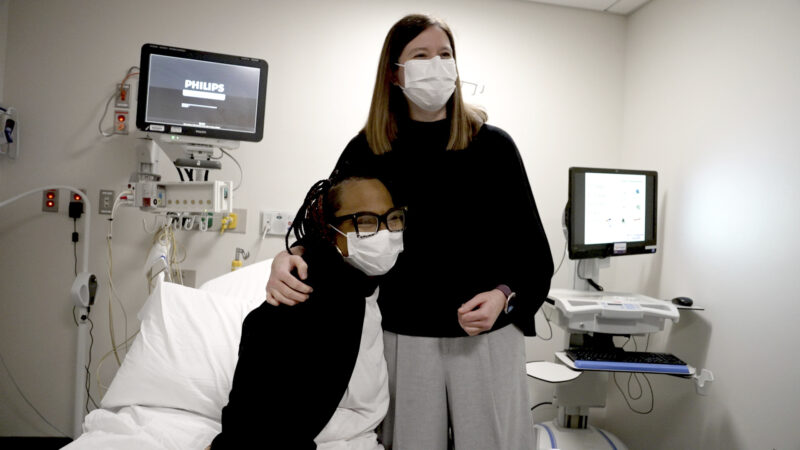An Alabama woman is doing well after the latest experimental pig kidney transplant
Pig kidney recipient Towana Looney sits with transplant surgeon Dr. Jayme Locke on Dec. 10, 2024, at NYU Langone Health, in New York City.
By Lauran Neergaard
NEW YORK (AP) — An Alabama woman is recovering well after a pig kidney transplant last month that freed her from eight years of dialysis, the latest effort to save human lives with animal organs.
Towana Looney is the fifth American given a gene-edited pig organ — and notably, she isn’t as sick as prior recipients who died within two months of receiving a pig kidney or heart.
“It’s like a new beginning,” Looney, 53, told The Associated Press. Right away, “the energy I had was amazing. To have a working kidney — and to feel it — is unbelievable.”
Looney’s surgery marks an important step as scientists get ready for formal studies of xenotransplantation expected to begin next year, said Dr. Robert Montgomery of NYU Langone Health, who led the highly experimental procedure.
On Tuesday, NYU announced that Looney is recuperating well. She was discharged from the hospital just 11 days after surgery although she was temporarily readmitted this week to adjust her medications. Doctors expect her to return home to Gadsden, Alabama, in three months. If the pig kidney were to fail, she could begin dialysis again.
“To see hope restored to her and her family is extraordinary,” said Dr. Jayme Locke, Looney’s original surgeon who secured Food and Drug Administration permission for the Nov. 25 transplant.
More than 100,000 people are on the U.S. transplant list, most who need a kidney. Thousands die waiting and many more who need a transplant never qualify. Now, searching for an alternate supply, scientists are genetically altering pigs so their organs are more humanlike.
Looney donated a kidney to her mother in 1999. Later a complication during pregnancy caused high blood pressure that damaged her remaining kidney, which eventually failed. It’s incredibly rare for living donors to develop kidney failure although those who do are given extra priority on the transplant list.
But Looney couldn’t get a match — she had developed antibodies abnormally primed to attack another human kidney. Tests showed she’d reject every kidney donors have offered.
Then Looney heard about pig kidney research at the University of Alabama at Birmingham and told Locke, at the time a UAB transplant surgeon, she’d like to try one. In April 2023, Locke filed an FDA application seeking an emergency experiment, under rules for people like Looney who are out of options.
The FDA didn’t agree right away. Instead, the world’s first gene-edited pig kidney transplants went to two sicker patients last spring, at Massachusetts General Hospital and NYU. Both also had serious heart disease. The Boston patient recovered enough to spend about a month at home before dying of sudden cardiac arrest deemed unrelated to the pig kidney. NYU’s patient had heart complications that damaged her pig kidney, forcing its removal, and she later died.
Those disappointing outcomes didn’t dissuade Looney, who was starting to feel worse on dialysis but, Locke said, hadn’t developed heart disease or other complications. The FDA eventually allowed her transplant at NYU, where Locke collaborated with Montgomery.
Even if her new organ fails, doctors can learn from it, Looney told the AP: “You don’t know if it’s going to work or not until you try.”
Blacksburg, Virginia-based Revivicor provided Looney’s new kidney from a pig with 10 gene alterations. Its parent company, United Therapeutics said Tuesday it plans to file an application with the FDA “very soon” to begin clinical trials with that type of kidney.
Looney was initially discharged on Dec. 6, wearing monitors to track her blood pressure, heart rate and other bodily functions and returning to the hospital for daily checkups before her medication readmission. Doctors scrutinize her bloodwork and other tests, comparing them to prior research in animals and a few humans in hopes of spotting an early warning if problems crop up.
“A lot of what we’re seeing, we’re seeing for the first time,” Montgomery said.
During a visit last week with Locke, who now works for the federal government, Looney hugged her longtime doctor, saying, “Thank you for not giving up on me.”
“Never,” Locke responded.
___
The Associated Press Health and Science Department receives support from the Howard Hughes Medical Institute’s Science and Educational Media Group. The AP is solely responsible for all content.
‘One year of failure.’ The Lancet slams RFK Jr.’s first year as health chief
In a scathing review, the top US medical journal's editorial board warned that the "destruction that Kennedy has wrought in 1 in office might take generations to repair."
Here’s how world leaders are reacting to the US-Israel strikes on Iran
Several leaders voiced support for the operation – but most, including those who stopped short of condemning it, called for restraint moving forward.
How could the U.S. strikes in Iran affect the world’s oil supply?
Despite sanctions, Iran is one of the world's major oil producers, with much of its crude exported to China.
Why is the U.S. attacking Iran? Six things to know
The U.S. and Israel launched military strikes in Iran, targeting Khamenei and the Iranian president. "Operation Epic Fury" will be "massive and ongoing," President Trump said Saturday morning.
Sen. Tim Kaine calls on the Senate to vote on the war powers resolution
NPR's Scott Simon talks to Sen. Tim Kaine, D-Va., about the U.S. strikes on Iran.
Iran strikes were launched without approval from Congress, deeply dividing lawmakers
Top lawmakers were notified about the operation shortly before it was launched, but the White House did not seek authorization from Congress to carry out the strikes.





